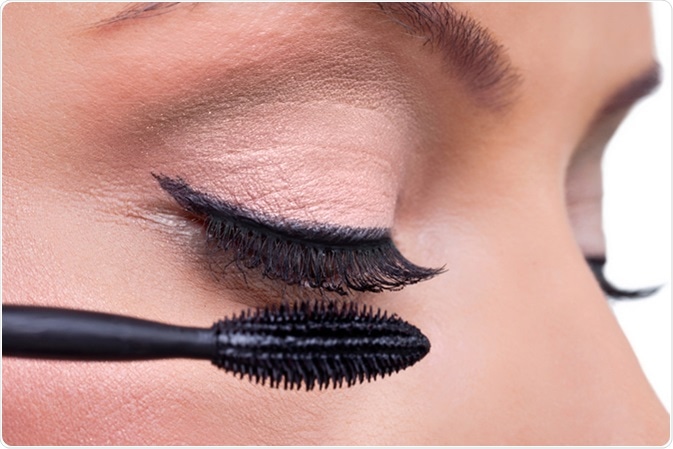Applying make-up is an everyday routine for millions of people worldwide. Even if a person only applies make-up once or twice a week, maintaining good make-up hygiene is essential in preventing skin irritations and serious eye infections.
How to practice good make-up hygiene
There are a number of simple but important steps that can help to prevent eye irritation and eye infections.
Renew your make-up every three months to reduce the risk of developing infections. This is particularly true in the case of eye make-up like mascaras or eyeliners. In some rare cases, women who have developed an eye infection from cosmetics have been temporarily or permanently blinded, according to the FDA. Some of these infections may stem from the make-up wands or brushes themselves.

Image Credit: Lucky Business / Shutterstock
Once a mascara wand or eyeliner brush comes into contact with the eyelashes, contamination of the applicator occurs as eyelashes naturally have bacteria on them. Over time, this contamination of both the brush and the container builds up and can lead to an increased risk of infection or allergic reactions. For this reason, sharing cosmetics is not advised at any time, as bacteria can harm another person even if the original user does not experience any reactions or infections themselves.
Avoid applying make-up at the meeting of the eye and the eyelid to avoid blocking the important Meibomian oil glands, and causing dry eye.
Fortunately, most people won’t experience any problems using make-up for longer than three months. If irritation does occur after using make-up products, it is essential to stop using the product immediately. If the irritation persists, medical attention should be sought.
Storing make-up products properly is also important. If cosmetics are stored in particularly hot conditions, for instance above 85°F (29°C), the preservatives in the products are at a higher risk of deteriorating.
Risks associated with eye-make up
It is important to remove make-up before sleeping. Ophthalmologist Dana Robaei published a case study in 2018 about a woman suffering from chronic foreign body sensation in both of her eyes. The article detailed the harmful effects that can occur after leaving mascara on overnight.
After examining the eyes, Robaei found subconjunctival mascara deposition beneath both eyelids. This was due to over 25 years of heavy mascara use without taking care to remove it properly. Small pieces of mascara had built up inside the eyelid and formed into solid concretions that were scratching the cornea, resulting in irritation and discomfort. The patient was left with permanent scarring on the cornea and on the eyelid after a surgical procedure to remove the built up concretions. Although Robaei clarifies it was a rare and extreme case, it nevertheless highlights the importance of removing eye make-up properly every night.
Other reports have been made about the risk of mascara-induced damage to the lacrimal drainage system, with one patient developing a dacryolith (a concretion usually comprising lipids, epithelial cells and other debris) loaded with mascara. Other reports in literature reviews on problems caused by mascara include eyelid dermatitis, infection keratitis, and mascaroma, among others.
Additionally, not all make-up applied to the eyes remains within the area of application. For instance, mascara can flake off and small particles travel into the eye, causing redness or irritation. In other cases, the eye can be scratched by make-up brushes or pencils that can then lead to serious eye infections. Ensuring that any applicator used near the eyes is clean can help to reduce the risk of scratch-induced infections. However, the trauma caused by scratches may still trigger problems or reactions.
Summary
As most make-up and cosmetic products undergo rigorous testing before being sold, the daily use of make-up is thought to pose minimal initial risk. It is when make-up is not removed properly, contaminated, or used when individual allergies are already apparent, that risks of infection, irritation and permanent damage to the application area increase.
A microbial study asked forty women to use one of two brands of non-waterproof mascara every day for three months. It was found that out of the 33 samples collected from the 40 women, microbial growth was present in over 36% of mascara containers.
As such, the need to practice good make-up hygiene is clear. Careful application of make-up around the eyes can reduce the risk of eye injury and subsequent irritation, infection, and loss of vision, in rare cases.
Further Reading
Last Updated: Mar 14, 2019